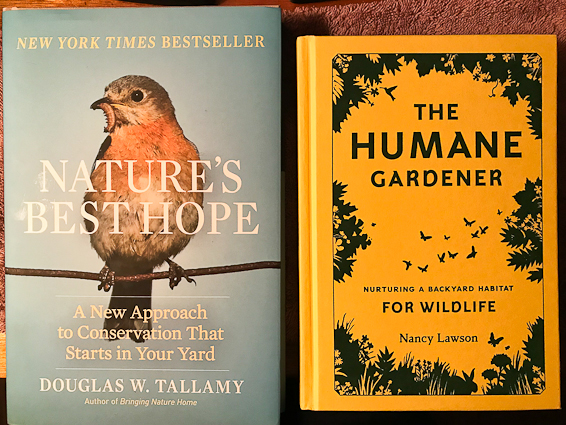| Back to Back Issues Page |
 |
|
Under the Arbor Issue 33 November 21, 2022 |
In This Issue:~ Including the Earth in Your Christmas Celebration ~Christmas is coming, and our thoughts are starting to turn to gift-giving and celebration. Why not expand our awareness, gratitude and love beyond just our human family and friends, to include the Earth and all the other "family members" with whom we share this planet? After all, everything that builds and sustains our physical lives ultimately comes from the Earth -- water, food, air, minerals and everything else that our bodies and minds use for life and for fun. And all the Earth's living ecosystems are our dance partners on our spinning ball of rock and water. 
Two GREAT Books to Read or Gift
WhyEarth and her interlocking ecosystems evolved (or were created) to sustain life indefinitely. Powered by sunlight, these intact, balanced ecosystems have been cycling raw materials around and around through innumerable bodies for roughly, oh… about the last 3.7 billion years, last time I counted.It's set up so that plants take recycled elements and minerals (the "capital") and, using sunlight for energy, create food ("the interest") that supports life on Earth. It would seem, however, that we humans have now moved beyond "living on the interest" generated by plants, to "delving into the capital" by using Earth's materials in a one-way, consumptive process. We gobble up minerals and other resources and take them out of nature's infinite recycling system, transforming them and locking them away as "stuff" (cars, skyscrapers, computers, blow-up Halloween yard monsters, refrigerators, furniture, etc.). We have taken so much raw material out of circulation that the system -- as-is -- is no longer capable of generating sufficient "interest" for us to live on indefinitely, at least not at our current population level. How might we participate in restoring balance while still feeling fulfilled? I believe if we shift our perspective from endless "how can I get more so I will be happy" to "how can I find joy in giving back and serving", we will discover that true joy comes from sharing through give-and-take relationships, rather than the shallow pleasure that comes from temporarily "getting", "distracting", "winning", "succeeding" etc. Believe it or not, nothing brings me more joy now than watching thirty-plus species of bees, butterflies, moths, birds and other creatures zooming, eating and nesting in my colorful, texture-rich, low-maintenance pollinator garden, which has expanded year-by-year until now the lawn is a small, sad, pitiful goner whose days are numbered.
Start in Your Own Backyard (or Front)Since less than 3% of the continental US now remains "wild" with intact ecosystems, for our own benefit we now urgently need to go farther than merely protecting what is left. We need to widen our anthropocentric perspective to embrace, nurture and care for the Earth and our fellow inhabitants, upon which our own lives ultimately depend. We can begin in our own yards -- creating gardens that mimic the wild "gardens" that humans replaced with buildings and lawns.Now since we are hardwired to be social beings, many people feel pressured to "be a good neighbor" by conforming to some "perfect-lawn-and-landscaping" standard. The unspoken rule in my gentrifying neighborhood used to be "wage glyphosate war on dandelions!", but much of that sentiment has shifted now. Unfortunately, a few neighbors now believe that a green plastic lawn is the most "ecological" option because it doesn't "need" herbicides. But it doesn't support any life, not even earthworms. But now the most popular, and the only really "ecological" yardscape anywhere, is restored native habitat, the way the land looked before humans built permanent structures on it. In the "prairie" climate of Denver where I live, that means perennial wildflowers and grasses which are beautiful, low-maintenance, low water-use and which provide pollinator habitat and forage, which in turn supports birds and the larger ecosystem. We are becoming not only good neighbors with our fellow humans, but with all our animal, plant and insects friends that inhabited this land before us. And we don't "need" chemicals, fertilizers, lawn mowers, weed-whackers, leaf-blowers, etc.
How to Help through Gifts for Family, Friends and the Earth1) Great books to give as presents (and to read yourself this winter):Nature's Best Hope by Douglas Tallamy The Humane Gardener by Nancy Lawson The Ecological Gardener by Matt Rees-Warren 2) If you have kids, buy the fun, educational card game Ecosystem by Genius Games 3) Give native perennial seeds as gifts. Xerces Society has regional plant lists for free online, and Botanical Interests Seeds, Prairie Moon Seeds, High Country Gardens and others offer great selections. 4) And as a present to the Earth and its biosphere, donate to Xerces Society, Nature Conservancy, Bionutrient Food Association or another life-promoting organization.
DedicationVegetable Garden Guru is dedicated to the renewal of regenerative, sustainable, organic vegetable gardening around the world. May we become gardeners of healthful, nutrient-dense food, careful stewards of soil, and may the plants we tend remind us to always keep growing toward the Light.
|
| Back to Back Issues Page |
